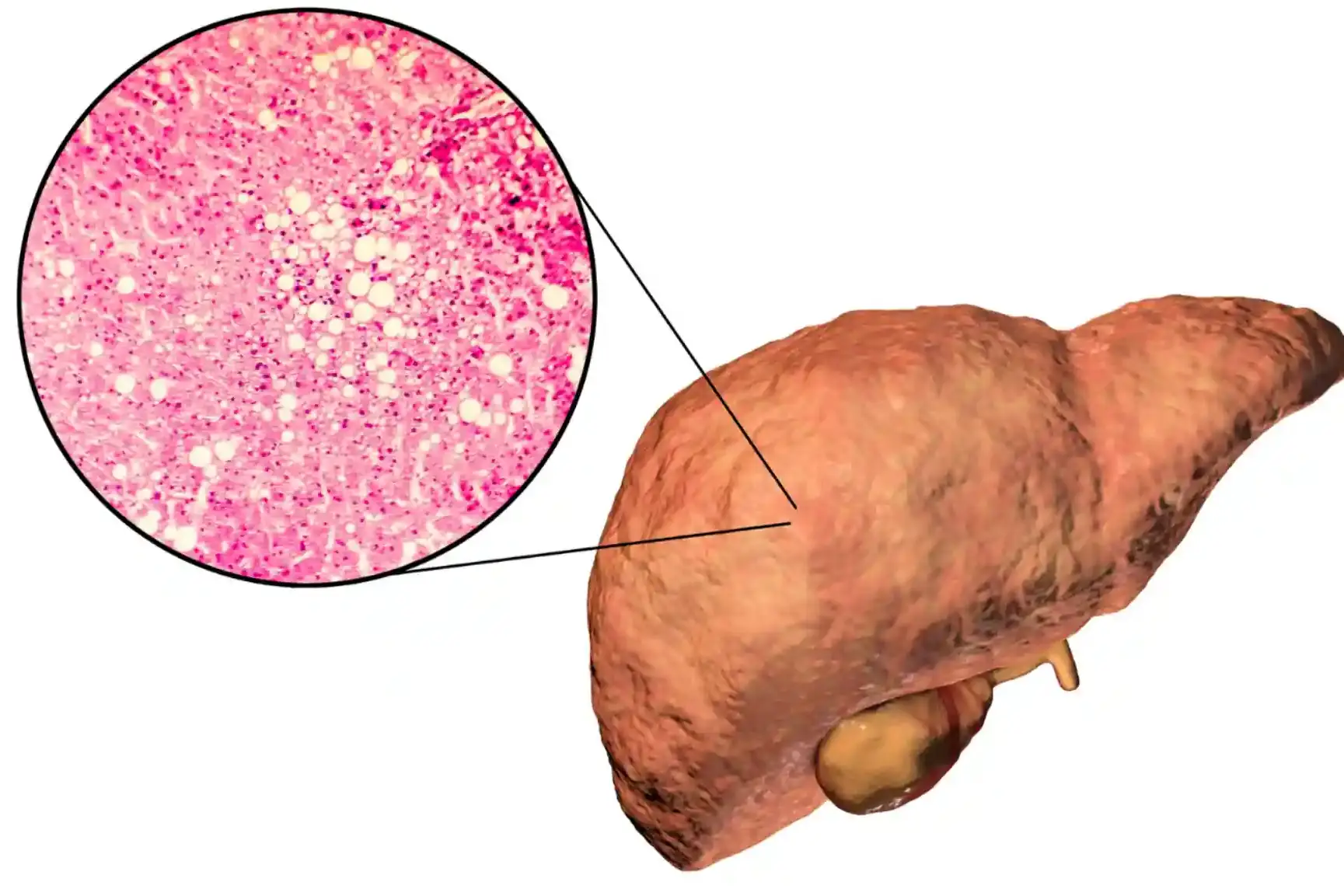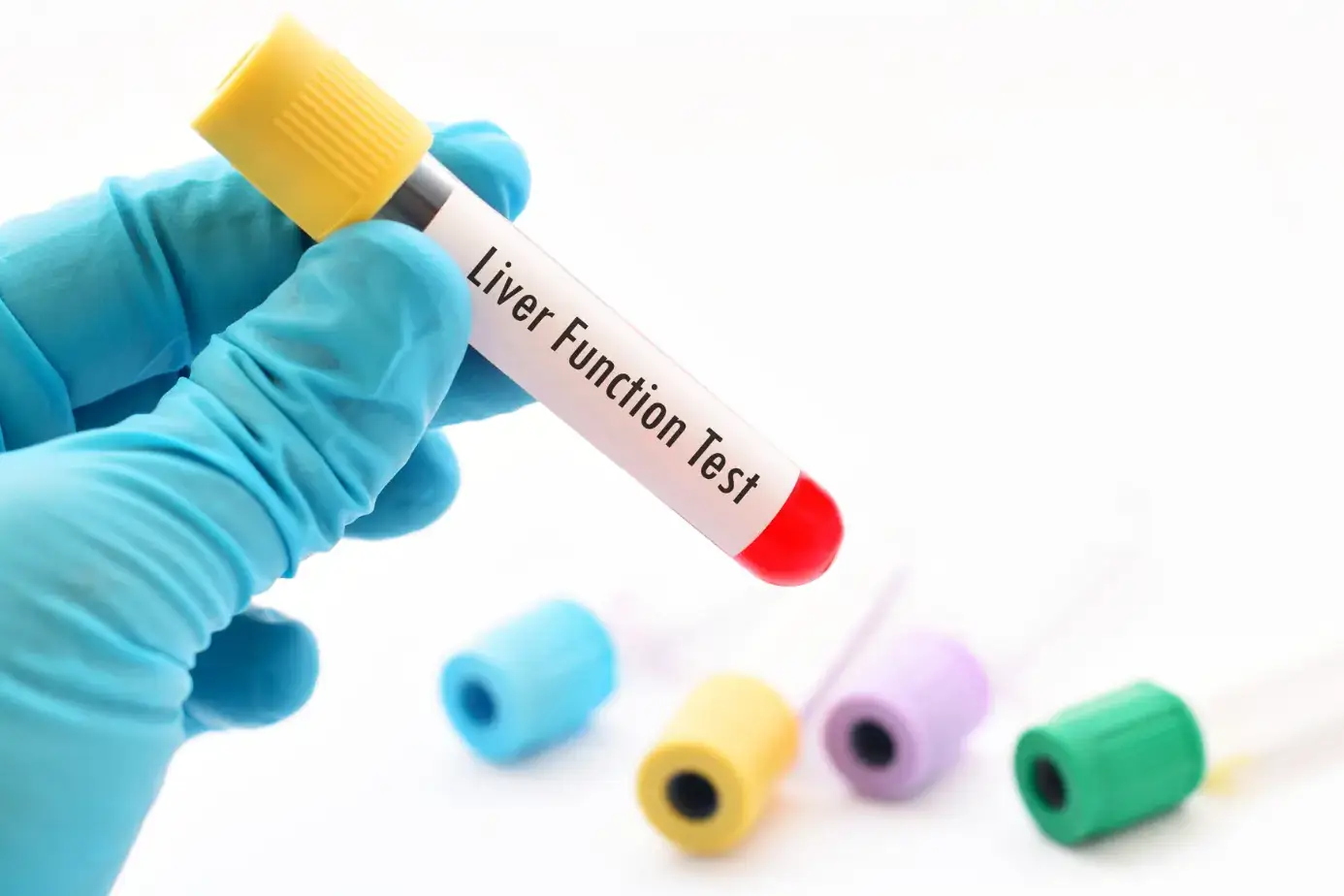Rectal cancer begins in the rectum, which is the last few inches of the large intestine. It’s vital to know the main risk factors for this cancer. Some of these risks are in your hands. You can reduce your chances through lifestyle changes and preventive care.
Table of Contents
ToggleThis guide looks at the causes and risks of rectal cancer. It covers what you can change and what you can’t. Knowing about the factors that lead to rectal cancer helps you make smart choices. These choices can lower your risk and help find it early through regular checks.
The article will also talk about how diet, lifestyle, genes, and the environment affect your risk. You’ll get tips on how to stay healthy. And how to keep your well-being in check.
Understanding Rectal Cancer
Rectal cancer starts in the rectum, which is the final part of the large intestine. It serves as a storage space for waste before the body eliminates it. When abnormal cells start growing in the rectum, they may form a tumor.
This tumor can grow and spread to other parts of the body. Knowing about the rectum and how it works helps us understand rectal cancer better. It also helps us see how rectal cancer is different from other colorectal cancers.
Definition and Overview
Rectal cancer is a type of cancer that starts in the last part of the large intestine. Specifically, it starts in a part called the rectum. Most rectal cancers are adenocarcinomas, which means they come from gland cells in the rectum.
Rectum Anatomy and Function
The rectum is at the end of the colon and is about 4-5 inches long. Waste is stored here before it’s passed out of the body. This place is where the colon sends stool, stores it for a bit, and then helps it leave the body.
Understanding how the rectum works can show us the effects of rectal cancer. It also highlights the challenges this cancer presents compared to other kinds of colorectal cancer.
Risk Factors You Can Control
Age and family history can’t be changed, but you have a big say in other risk factors for rectal cancer. By managing your lifestyle and behaviors, you can lower your chances of getting the disease. Knowing and acting on these factors is key to staying healthy. It’s all about being proactive.
Diet and Nutrition
Your diet has a big impact on rectal cancer risk. Eating too much red or processed meat, and foods charred or grilled, can raise your risk. But adding lots of fruits, vegetables, and foods with fiber can lower it. Eating healthier is a smart way to lower the risk of rectal cancer.
Obesity and Lack of Exercise
Staying at a healthy weight and being active are crucial. Being obese or not moving enough means a higher risk of rectal cancer. Doing activities like walking, cycling, or swimming reduces this risk. It keeps your body healthy and decreases inflammation. So, keep moving to stay safe.
Smoking and Alcohol Consumption
Smoking and drinking too much up your odds of rectal cancer. Smokers have a 30 to 40 percent higher risk of dying from colorectal cancer. To cut these risks, quit smoking and watch your drinking. These changes will help a lot.
Start living healthily by eating well, moving often, and not smoking or drinking too much. This approach significantly lowers your risk of rectal cancer. Plus, it makes you feel better all around by boosting your health and energy.
what causes rectal cancer
The exact cause of most rectal cancers is not fully understood. But, it’s linked to changes in the genes and cells of the rectum’s lining. The disease often starts when the DNA inside cells changes. These DNA mutations stop the cells from following their usual instructions. This can make them grow and divide uncontrollably, forming cancerous cells.
Cellular Changes and DNA Mutations
These unusual cells keep growing and can form a tumor. This tumor might expand and sometimes spread to other body parts. The shift from normal to cancerous cells is slow. It’s influenced by genes and the environment over time, causing rectal cancer to develop.
Tumor Growth and Metastasis
This rectal cancer tumor growing and spreading can be very harmful. The cancerous cells might invade nearby tissues and organs. They could also move through the blood or lymph to other parts of the body. Knowing what causes these changes and growth is key to finding ways to prevent and treat rectal cancer.
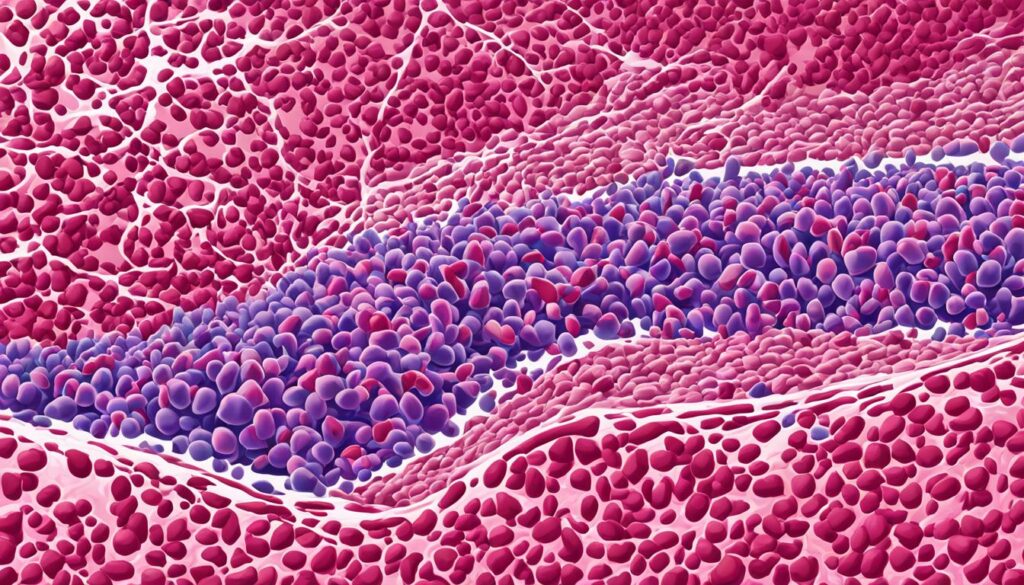
Age as a Risk Factor
As you age, the chance of getting rectal cancer goes up. Most cases are in people over 50. This could be because of changes in cells and more mutations over time. But, recent years show more rectal cancer in those in their 20s and 30s.
Increasing Risk with Age
Getting older means a higher risk of rectal cancer. The disease is often found in people over 50. Yet, more young adults are getting it. Knowing your risk and doing early screening is vital, especially if the cancer runs in your family.
Early-Onset Rectal Cancer
Youth with rectal cancer is a growing concern. It demands more attention. If you might be at risk, like if it’s common in your family, talk to your doctor about early checks. Catching it early is key for better treatment.
Inherited Conditions and Genetic Factors
Some genetic conditions can make your chances of getting rectal cancer higher. Two common ones are Lynch syndrome and familial adenomatous polyposis.
Lynch Syndrome
Lynch syndrome comes from problems in DNA repair genes. This can cause colon and other cancers in younger people. Those with Lynch syndrome face a bigger risk of getting rectal cancer. Their tumors might often show on the right side of the colon.
Familial Adenomatous Polyposis (FAP)
FAP means you grow lots of polyps in your colon and rectum. These polyps can turn into cancer quickly, sometimes by age 20. It’s very important to find and watch people with FAP to stop rectal cancer from growing.
Other Inherited Syndromes
Besides Lynch syndrome and FAP, several rare ones can increase rectal cancer risks. For example, conditions like hereditary mixed polyposis, MYH-associated polyposis, and serrated polyposis syndrome. It’s key to get genetic testing and advice if you have a family history of rectal cancer. This can help lower your risk.
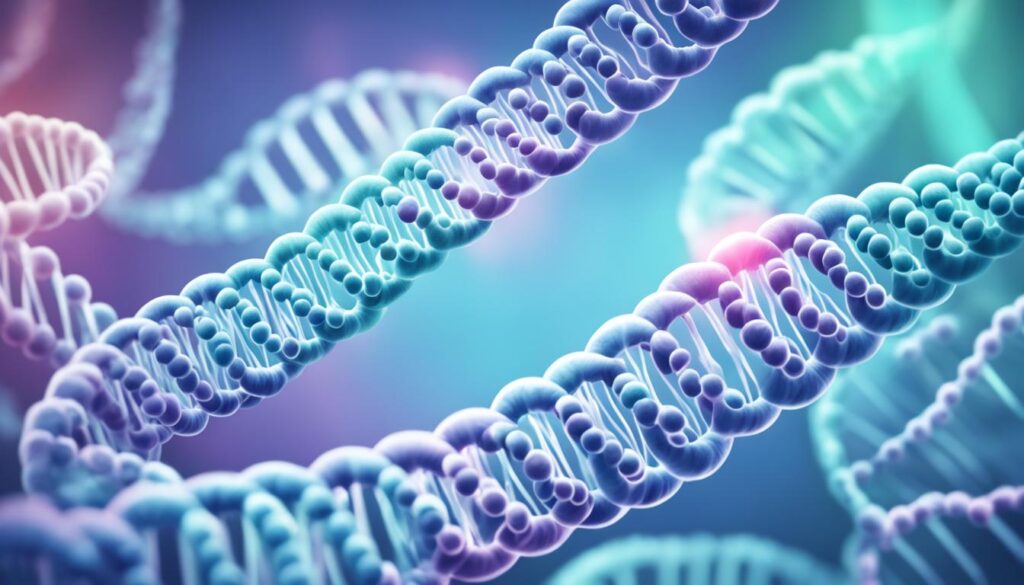
Personal and Family History
Your medical history and your family’s can make rectal cancer more likely. If you’ve had colorectal cancer or precancerous polyps (adenomas) before, your chances of getting it again go up. The reasons for your first issue, like genetics or the environment, might stay the same.
If someone in your family had colorectal cancer, especially a close family member at a young age, your risk goes up. This could be from shared genes. Or, it might be from lifestyle factors you all have in common. Knowing about your personal history of rectal cancer and family history of colorectal cancer is key. It helps in deciding on the right tests and ways to lower your risk.
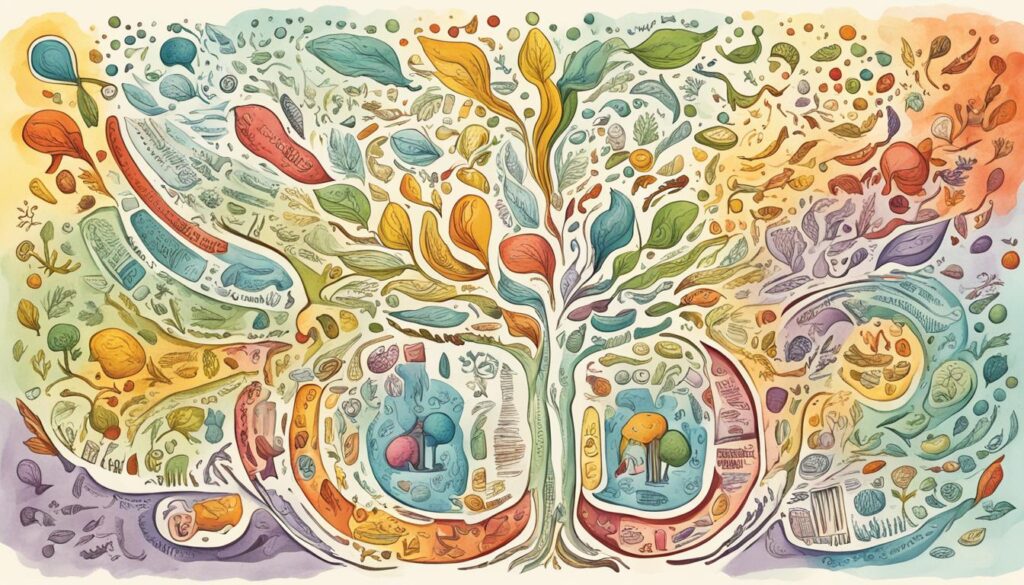
Inflammatory Bowel Diseases
Inflammatory bowel diseases (IBD) can lead to a higher chance of getting rectal cancer. Ulcerative colitis and Crohn’s disease are the main conditions that increase this risk.
Ulcerative colitis causes long-term swelling and sores in the colon and rectum. Crohn’s disease affects different parts of the digestive system and can also impact the rectum. The damage from these diseases can create areas prone to cancer. Because of this, people with long-term IBD should have frequent screenings. This helps find rectal cancer early.
Ulcerative Colitis
People with ulcerative colitis are more likely to get rectal cancer than others. The chance of getting cancer goes up the longer you have the disease. For example, after 30 years, there is a 13.9% risk.
The risk increases if the swelling is severe or spreads widely. Having primary sclerosing cholangitis or a family history of this cancer also makes the risk higher.
Crohn’s Disease
Crohn’s disease also ups the risk of getting rectal cancer. Unlike ulcerative colitis, the overall risk isn’t as high. Still, the ongoing inflammation can lead to cancer over time.
After 30 years, the risk peaks at 8.3%. Despite being lower, it’s crucial for Crohn’s disease patients to stay vigilant about cancer screenings.
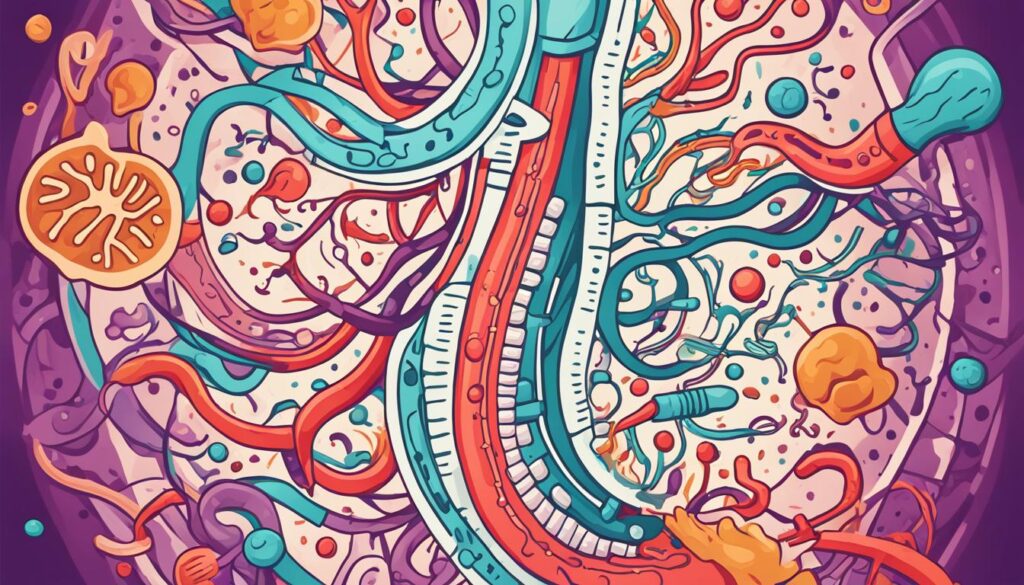
People with long-standing IBD must have regular cancer checks. Working closely with doctors to manage IBD lowers the cancer risk.
Radiation Exposure and Cancer Treatment History
Getting radiation, whether for treatment or from the world around us, can increase the chance of getting rectal cancer. Children and adults who have gotten radiation around their stomach or pelvis are more likely to get rectal cancer later. This happens because radiation can harm the cells that line the rectum.
Survivors of other cancers who had radiation as part of their treatment might also face a higher risk for rectal cancer. It’s important for those who have had radiation to their pelvis or abdomen to get regular screening. More research is needed to fully understand how radiation exposure links to rectal cancer development.
Racial and Ethnic Disparities
Recent studies show big differences in how often people get rectal cancer and how many die from it. African Americans and American Indian/Alaska Native folks seem to be affected the most. They have higher chances of getting rectal cancer and dying from it than other groups.
Higher Rates Among Certain Groups
New data reveals that African Americans have a higher risk of getting rectal cancer than white people. The trend continues with Native American and Alaska Native individuals facing elevated risks. Shockingly, Black Americans with rectal cancer tend to be younger at diagnosis than their white counterparts.
They are also more likely to get diagnosed before reaching 50. The average age for a diagnosis among Black Americans is younger than for white Americans.
Potential Contributing Factors
The reasons behind these disparities are many. Genetic differences might be a factor. But experts also point to things like where and how people live, eat, and take care of themselves.
Access to good healthcare, including early cancer checks, is also important. Without these, disparities in cancer outcomes can’t be addressed.
It’s crucial to make sure everyone, no matter their background, can get screened early and treated well for rectal cancer. Tackling these disparities can help lower the disease’s impact and save lives.
Gender Differences in Rectal Cancer Risk
New studies show differences based on gender in rectal cancer risks. They find that men with rectal cancer are more likely to pass away than women. This could be due to various factors like hormone levels and immune system differences. Specifically, women might face a greater risk of right-sided colon cancer after menopause. Recognizing these patterns can help make screenings and treatments more effective based on an individual’s sex.
These gender gaps underline the need to focus on different factors for men and women when looking at rectal cancer risks. By understanding and acting on these differences, doctors can provide better care and management. This could lead to a significant improvement in rectal cancer treatment outcomes.
Lifestyle and Environmental Factors
Many things can raise the chance of getting rectal cancer. What you eat and how you live are big parts of this. For example, eating a lot of red and processed meats or cooked meats can increase your risk. But, eating plenty of fruits and veggies, and foods with fiber can lower it.
Diet and Nutrition
Eating the wrong foods can make rectal cancer more likely. This includes too much red and processed meats or charred or grilled meats. On the flip side, adding more fruits, vegetables, and fiber-rich foods to your meals can decrease this risk.
Physical Activity Levels
How much you move is also key. Sitting around a lot makes rectal cancer more of a threat. On the other hand, staying active helps lower your risk. So, it’s important to keep moving and work out often.
Environmental Exposures
Certain environmental factors can be risk factors too. For instance, radiation from medical or other sources can up your risk. Also, coming into contact with poisonous chemicals and toxins in your surroundings can be harmful.
Screening and Early Detection
Regular screening and catching cancer early are vital in fighting rectal cancer. Most doctors suggest starting screening for rectal cancer at 45. People at higher risk should start earlier and screen more often. This includes those with a family history or past polyps or cancer.
Recommended Screening Guidelines
It’s very important to get screened regularly for colorectal cancer. Only 4 out of 10 cancers are caught early. But, when caught early, it’s often curable. So, getting checked can save your life.
The death rate in the U.S. from colorectal cancer is dropping. This is because more polyps are being found early. Yet, 1 in 3 people who should get tested haven’t. They might not know, worry about cost, or have insurance issues.
Screening Methods and Options
There are a few ways to get screened, like with a colonoscopy or a simple stool test. Each method has its ups and downs. Talk with your doctor to pick what’s best for you. They’ll consider your risk for rectal cancer and what you prefer.
Screening doesn’t just find cancer. It can also stop it by catching and removing polyps early. Polyps can turn into cancer if left alone, but it can take over a decade. If cancer is found early and hasn’t spread much, you have a good chance of beating it. About 9 out of 10 people with early-stage colorectal cancer live past 5 years.
Prevention Strategies
While there’s no guaranteed way to avoid rectal cancer, certain steps can help lower your risk. These include changing diet and lifestyle habits. Eat lots of fruits, veggies, and whole grains. Cut down on red and processed meats. Keep a healthy weight and stay active. These choices can significantly reduce your chances of getting rectal cancer.
Dietary and Lifestyle Modifications
Improving your eating habits by focusing on plant foods and less red meat is a good start. Also, staying fit through exercise can help. Regular physical activity decreases your risk.
Regular Screening and Follow-up
Getting screened as advised can make a big difference. Tests like colonoscopies find problems early. This makes treatment easier. Early discovery is key to fighting rectal cancer.
Genetic Counseling and Testing
For those with a family history, genetic testing helps. It checks your risk and guides personalized prevention. More screenings, lifestyle changes, or even special medications might be part of your plan.
Conclusion
Rectal cancer is complex, with many risk factors. Some can be changed with lifestyle choices and prevention efforts. Yet, some factors are beyond your control. By knowing what leads to rectal cancer, you can lower your risk and find it early through regular screenings.
Living healthy, getting the right tests, and exploring your family history with genetic counseling can all help. They can lessen the impact of rectal cancer. With ongoing research, both healthcare experts and you must stay alert. This helps in spotting and dealing with the risk factors. This makes life better for those facing rectal cancer.
Make rectal cancer prevention and early detection a top priority. By doing this, you’re looking out for your health. You’re also cutting down your chances of dealing with this serious disease.
FAQ
What is rectal cancer?
Rectal cancer starts in the rectum, which is the last part of the large intestine.
What are the key risk factors for rectal cancer?
Key risk factors include age, family history, and certain genetic conditions. Others are inflammatory bowel diseases, radiation, and lifestyle factors like diet and smoking.
Can rectal cancer risk be reduced through lifestyle changes?
Yes, a healthy diet, maintaining weight, and regular exercise can help. Also, avoid smoking and limit alcohol to reduce the risk.
How does rectal cancer develop?
It starts with abnormal DNA and cell growth in the rectum. This can form a tumor that grows and may spread.
Is age a significant risk factor for rectal cancer?
The risk increases with age, especially after 50. More young adults are getting rectal cancer, which is worrying.
What inherited genetic conditions are linked to rectal cancer?
Lynch syndrome and familial adenomatous polyposis (FAP) are the main genetic conditions tied to higher rectal cancer risk.
How does personal and family history impact rectal cancer risk?
Having had colorectal cancer or polyps, and family history, especially in close relatives, can raise your risk.
Can chronic inflammatory bowel diseases contribute to rectal cancer?
Conditions like ulcerative colitis and Crohn’s that cause gut inflammation increase the risk of rectal cancer.
Is there a link between radiation exposure and rectal cancer?
Yes, radiation from medical or environmental sources is linked to higher rectal cancer risk.
Are there racial and ethnic disparities in rectal cancer incidence and outcomes?
Some groups, like American Indians, Alaska Natives, and African Americans, face greater risks and worse outcomes from rectal cancer.
Are there gender-based differences in rectal cancer risk and outcomes?
Men with rectal cancer are more likely to die than women. The reasons for this difference are still unknown.
What lifestyle and environmental factors can contribute to rectal cancer risk?
High consumption of red and processed meats, along with a sedentary life and possible radiation, increase the risk.
How important is regular screening for rectal cancer?
Regular screening and early detection can reduce the impact of rectal cancer. It’s advised to start screening around age 45.
What strategies can help prevent rectal cancer?
A healthy diet, proper weight, exercise, no smoking, less drinking, and following screening advice can prevent rectal cancer.
About The Author

Medically reviewed by Dr. Nivedita Pandey, MD, DM (Gastroenterology)
Dr. Nivedita Pandey is a U.S.-trained gastroenterologist and hepatologist with extensive experience in diagnosing and treating liver diseases and gastrointestinal disorders. She specializes in liver enzyme abnormalities, fatty liver disease, hepatitis, cirrhosis, and digestive health.
All content is reviewed for medical accuracy and aligned with current clinical guidelines.



